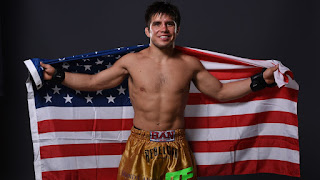We've now seen five boxing films since the start of this class, and the underlying narrative of the boxing film as a genre is starting to reveal itself. One of the threads of this narrative, running particularly strong in films such as The Set-Up, Body and Soul, and On the Waterfront, is the struggle of the working class to overcome the greed and corruption that accompanies wealth and success. Boxing films are almost by design perfect mediums for capturing a uniquely American experience.
The revolutionary social mobility that America is famous for translates perfectly into the boxers story. Charley Davis, a poor New Yorker is able to work his way to the top. Stoker Thompson dreams of winning a title shot and fighting his way to an easier life. Terry Malloy lives with a chip on his shoulder ever since the day he was forced to throw a fight that could have made him "a contender". Boxing is fiercely competitive. A primal activity, with some civilizing modifications. It is simultaneously an intensely personal experience and a dehumanizing clinical one. Like an escort with her client, the two boxers are disinterested in each other, seeing only the means to their end, an obstacle in their path. Both occupations lack the same thing: passion. The passion is still there of course, but it has shifted from it's natural position, the escort does not love her client, and the boxers do not truly wish to hurt each other. Lacking extrinsic motivation, the passion must come from within the boxer himself, and it comes in the form of a dream. The American Dream, a dream of improvement, of a fair chance, hard work and a better future. Whether it's money, safety, fame, family, women, etc, everybody has something they want.
Of course, even that ultra-competitive, dog-eat-dog world is only a facade. The ideal to strive for. A cover for an even more cutthroat, less fair underworld. As in real life, so too in boxing movies does the corruption, and crime inspired by unchecked greed and competition creep in. Stoker Thompson refuses to throw his fight, which has been fixed without his knowledge. Charley Davis refuses to throw his last fight, rejecting greed and reestablishing himself in his community and family. Terry Malloy works under the exploitative criminal organization that has taken over his union. The same organization that caused him to throw a fight, resulting in the end of his boxing career. What should be fair, honest competitions morph into brutal casinos where the nefarious, yet wealthy elements of society exploit working men for entertainment and profit. The allusions to communism and corrupt capitalism write themselves, largely because they were intentionally placed by sympathetic writers and directors. Persecuted by the HU
AC, many directors during the 40's and 50's, communist or not, had strong opinions on the subject.
A less common definition of the word Champion is: "a person who fights for or defends a person or cause". In this sense, boxing films offer a unique opportunity for the filmmaker. At their most basic, a boxer is simply a fighter. Someone who steps into the ring to face down an opponent. From this, a filmmaker can create many different "champions". The fight, in most cases, is the least important part of the film, it is why the boxer fights that truly matters. The line from Body and Soul fits here particularly well: "Then fight for something, not for money". Stoker Thompson fought for his future, and was punished for it, but his bittersweet ending suggests that society smiles on those who refuse to be corrupted. Charley Davis was heading down a path of self-destruction, and only recovered after rejecting corruption and, in essence, championing for his community. Of particular interest in this analysis is Terry Malloy confrontation with the criminal union, literally becoming a champion for his community.
A boxer is not a blank canvas, the story of the boxer demands conflict, demands passion, success, failure, and rage. A successful filmmaker can mold champions, raging animals, heroes out of these fighters, whereas a less successful one would essentially create a walking, talking punching bag.In the three films previously mentioned, the filmmakers crafted underdogs, working-class heroes punching above their weight, struggling to find a place for themselves in a world that has all but forsaken them in the endless pursuit of money. They have created American success stories that reject their current reality for a purer, ideal version that just might be worth fighting for.





No comments:
Post a Comment